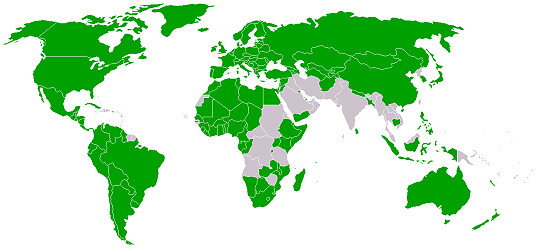The sharp-eyed among you may have noticed that I've finished reading Jared Diamond's Collapse. I started reading it way back in April, put it down to do some higher priority reading, and have only just got round to finishing it. I'm glad I made the effort.
Much of Collapse consists of the stories of past societies which, for one reason or another, disappeared. Easter Island, the Maya, the Anasasi of the American Southwest are just some of the examples. Many of these stories (and particularly those of Pitcairn and Henderson and the Greenland Vikings) are relentlessly depressing. Diamond identifies four factors which may contribute to a society's collapse: environmental damage, climate change, hostile neighbours and disruption of trade links. But the most important factor is how that society responds to its challenges. Sometimes, as in the case of Pitcairn and Henderson, nothing can be done. These societies were locally unsustainable colonies effectively supported by trade; when that trade dried up (due to the parent society engaging in environmentally unsustainable practices), the colonies slowly died off. In other cases, as with Tokogawa Japan and Tikopia, changes can be made which ensure sustainability and social survival (Tokogawa Japan enacted strict laws to prevent deforestation; the Tikopians killed all their pigs because they recognised that they were destroying their island's fragile environment). But the most tragic cases are those where a solution was clearly possible, but was not taken - as in Greenland, where a Viking colony died out because of their refusal to eat fish (!) and insistence on trying to live as European sheep-herders in an environment which simply did not support it.
There are also some chapters devoted to modern societies under pressure - Rwanda, Haiti, China and Australia - which provide modern examples of the same problems. Rwanda has effectively already suffered a collapse, with a genocide at least partly driven by overpopulation and intense pressure for land. Haiti's poverty is at least partly the result of their having destroyed their environment through deforestation. China and Australia face longer-term problems (pollution and outright unsustainability, respectively), which while less likely to lead to collapse, are going to have to result in significant changes if their societies are to survive.
There are two key points I took from Collapse. The first is the dependence of a society on its environment. The environment is the basis of the economy; it provides the food we eat, the water we drink, and the resources and services which make the production of houses and books and oil tankers and computers possible (there is now an entire subdiscipline of ecological economics devoted to studying these links, as well as applying economic thinking to environmental problems and vice versa). Most of Diamond's examples collapsed because they lived substantially beyond their ecological means (though sometimes they had no way of knowing they were doing so until it was too late). There's a leson there for all of us. The second, as mentioned above, is the importance of human choice. Faced with a crucial environmental challenge, we can choose to ignore it, or we can choose to adapt to or resolve it. Which choice we take will affect our quality of life, sometimes drastically. As Diamond notes,
[s]evere problems of overpopulation, environmental impact, and climate change cannot persist indefinitely: sooner or later they are likely to resolve themselves, whether in the manner of Rwanda or in some other manner not of our devising, if we don't succeed in solving them by our own actions.
In a world which is increasingly living beyond its means, we will be facing such situations more often. But thanks to globalisation and increasing interconnectedness (not to mention science, technology, and the lessons of the past), we have more capacity than ever before to solve those problems. I'm just hoping that we collectively manage to make the right choices...











